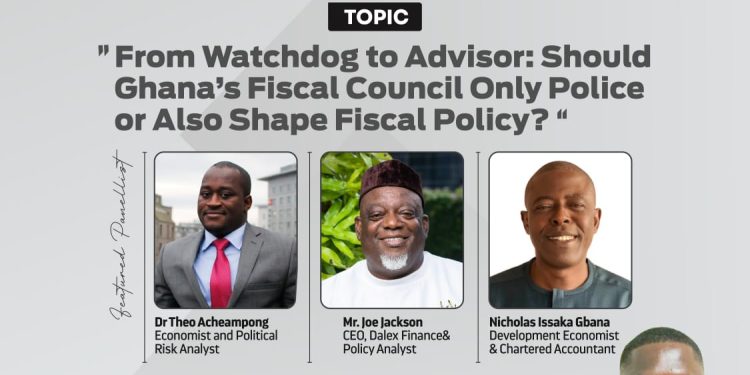- “From Watchdog to Advisor: Should Ghana’s Fiscal Council Only Police or Also Shape Fiscal Policy?”
Ghana’s new Public Financial Management (Amendment) Act (2025) has set the stage for one of the most important institutional reforms in recent years: the creation of an independent Fiscal Council (FC). Tasked with enforcing fiscal discipline and supporting Ghana’s ambitious target of a primary balance of at least 1.5% of GDP, the Council is being hailed as a potential game-changer for fiscal credibility.
But critical questions remain: Should the FC remain a strict watchdog—policing compliance with fiscal rules—or should it evolve into an advisor that helps shape Ghana’s fiscal policy and communicate with citizens and investors?
This question will take centre stage at the upcoming NorvanReports Xspace Conversation today, Sunday, 14th September 2025 at 6:00 PM GMT, hosted by @NorvanReports.
Why It Matters
Ghana has a long history of fiscal slippages, particularly in election years, that have eroded investor confidence and placed pressure on the cedi. The IMF-supported framework and new law attempt to correct course, but experience from across Africa shows that smart rules alone are not enough.
As a recent policy review of Ghana’s Fiscal Council warns, a purely “rules-based watchdog” risks being ineffective. Credibility will depend on whether the FC also builds capacity to:
- Provide independent forecasts and fiscal risk assessments,
- Support Parliament and the budget process,
- Communicate transparently with citizens and investors, and
- Conduct policy costings and ex-post evaluations.
The law already allows for these functions, but their success hinges on design, staffing, and political independence.
Implementation Challenges
The early years will be decisive. The Council must establish a skilled Secretariat of macroeconomists, debt analysts, and budget experts, backed by transparent data-sharing agreements with the Ministry of Finance and oversight institutions. Clear routines of publication and public engagement will be essential to build trust.
Risks loom large. Political interference, delays in data access, and underfunding could easily undermine the FC before it takes root. Experts stress the need for multi-year funding guarantees, robust appointment processes with technical vetting, and strong engagement with both Parliament and the public.
The Xspace Conversation
Against this backdrop, NorvanReports, with its partners Economic Governance Platform EGP and Ghana Anti-Corruption Coalition GACC will convene a panel of leading voices to debate the future of Ghana’s Fiscal Council under the theme:
“From Watchdog to Advisor: Should Ghana’s Fiscal Council Only Police or Also Shape Fiscal Policy?”
Featured Panellists:
- Dr. Theo Acheampong – Economist & Political Risk Analyst
- Mr. Joe Jackson – CEO, Dalex Finance Ghana
- Nicholas Issaka Gbana – Development Economist & Chartered Accountant
They will explore whether Ghana’s Fiscal Council can realistically enforce a 1.5% primary balance, how it should interact with Parliament and the public, and what role it must play to restore fiscal credibility.
Join the Debate
The conversation is not only about institutional design, it is about trust. Trust that Ghana can manage its public finances responsibly, rebuild investor confidence, and reassure citizens that fiscal rules are more than political promises.
📅 Date: Sunday, 14th September 2025
🕖 Time: 6:00 PM GMT
📍 Live on: @NorvanReports
Don’t miss this critical conversation on Ghana’s fiscal future.








